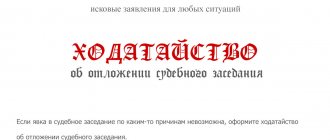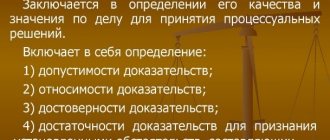- home
- Services
- Civil cases
- Civil cases
Termination of proceedings in civil proceedings is one way to close the dispute. Moreover, the dispute may end before it even begins if the judge finds out that resolving such a conflict is not within his competence. But if this form of closing a case has already been used, then it will not be possible to reopen it. Participants will have to find another reason to initiate protection of their violated rights through the courts.
Grounds on which a case may be terminated
The Civil Procedure Code of the Russian Federation has a separate article to outline all the grounds on which a judge can dismiss a case. And this is not just the right of the judge, but his duty; if any of the participants or the judge himself declares that there are grounds for dismissing the case, then it will be impossible to avoid it.
The case must be dismissed if:
- The claim must be considered outside the civil process;
- The application is submitted to protect the rights of another person, but the applicant does not have the authority to do so;
- The plaintiff demands to challenge acts that do not affect his interests;
- The dispute between the parties has already been resolved by a court or arbitration tribunal;
- Previously, the court recorded the plaintiff’s refusal of his claims or the conclusion of a settlement agreement;
- The citizen acting as a party to the case has died, or the organization has been liquidated, and succession in disputed legal relations is not allowed.
In procedural legislation, the list of grounds is exhaustive; the article does not contain a rule allowing the termination of a case on other grounds.
Grounds for suspension of the case
After the initiation of a criminal case, the pre-trial stage of the process follows. It can take the form of an inquiry or investigation. The conditions for suspending investigative activities are described in paragraph 1 of Article 208 of the Code of Criminal Procedure of the Russian Federation. We are talking about the following reasons:
- during the investigative measures the accused was not identified;
- the suspect fled the investigation;
- the location of the accused has not been established;
- the location of the suspect is known, but there is no possibility of his participation in the criminal case;
- the accused is seriously ill, as confirmed by the relevant medical report.
Most often, the investigation is suspended due to the impossibility of finding the perpetrator of the crime. Most of these cases remain unsolved. In some cases, processes are frozen for decades.
Having decided to suspend the criminal case, the investigator makes a corresponding decision. A copy of the document is sent to the prosecutor. If two or more accused are involved in one criminal case, and the identity of one of them has not been established, the investigator has the right to separate separate proceedings, suspending it. Then the examination of the main process will continue.
Wanted ad
If the identity of the suspect is established, but his location is unknown, the citizen is put on the wanted list. This fact may be indicated both in the decision to suspend the proceedings, and in a separate document. The second option is used more often. The attacker may also be put on the wanted list until the investigation is suspended.
Having established the whereabouts of the suspect, law enforcement officers can detain him on suspicion of committing a crime. If a citizen deliberately fled from justice, he may be taken into custody. The investigation authorities are looking for the missing person.
Special conditions
If the identity of the suspect has not been established or he has disappeared from the investigation, then the case can be suspended only after the completion of the period allotted for the investigation. Current legislation provides for the following terms for conducting preliminary investigative measures:
- inquiry – 1 month;
- investigation – 2 months.
The period of preliminary investigation may be extended up to three months in the presence of special circumstances. This is possible on the initiative of the head of the investigative body.
Responsibilities of investigators and interrogators
In order to suspend the criminal process at the pre-trial stage, the investigator or inquiry officer must issue a corresponding resolution. Before issuing it, the authorized official is obliged to:
- take all possible measures to find the suspect;
- carry out all activities that do not require the participation of the accused.
If the criminal case was suspended for reasons not specified in Article 208 of the Code of Criminal Procedure of the Russian Federation, then such actions are considered illegal. Having adopted a resolution, the prosecutor is obliged to examine it for legality and validity. If violations are detected, the prosecutor's office has the right to cancel the illegal decision of the preliminary investigation authorities. In this case, the criminal process is resumed, and the investigator receives instructions regarding additional measures.
Have a question for a lawyer? Ask now, call and get a free consultation from leading lawyers in your city. We will answer your questions quickly and try to help with your specific case.
Telephone in Moscow and the Moscow region: +7
Phone in St. Petersburg and Leningrad region: +7
Free hotline throughout Russia: 8 (800) 301-39-20
Procedure for terminating proceedings in civil proceedings
Once a claim is submitted to the court, it is reviewed for compliance with the law. The grounds for refusing to accept a claim partially overlap with the grounds for dismissing the case. And if the claim is nevertheless accepted for consideration, because the grounds for refusing to accept it have not been identified, then the case will still not be considered, but this will be done through another procedural action - termination of the case.
It is in the interests of the defendant to find a reason to terminate the consideration; therefore, he can submit a petition to the court, where he will explain in a reasoned manner on the basis of which he demands to terminate the process. A civil lawyer who knows all the intricacies of litigation will help you draw up such a petition.
The judge issues a ruling to terminate proceedings in a civil case. It is interesting that the article on refusal to accept a claim states that a private complaint . In relation to the determination to terminate the case, there is no such clause in the law.
What does the bailiff do before closing?
Usually the case is closed within six months after enforcement proceedings are opened. It seems that this period is enough to apply all the required measures and understand whether collection is even possible.
The law allows you to keep a hopeless case open for up to 3 years, but usually bailiffs don’t delay things like that and close cases much faster. But if there is movement on the account, the debtor pays something (even thanks to a compulsory measure), the account of these three years begins anew.
What does the bailiff do to collect the debt:
- As soon as the case reaches the FSSP, the specialist requests information from the Federal Tax Service and the Pension Fund about the official income of the debtor. When they are at their place of work or receive a pension, a resolution is sent according to which 50% of all income will be withdrawn from the debtor.
- If there is regular income, the case will not be closed; the debt is gradually repaid by retaining this 50%. If there is no such income, the bailiff proceeds with further actions.
- He submits requests to major banks in the country and region in order to find the debtor’s accounts, cards and deposits. If they are discovered, all money located there is confiscated. All future applicants will also be selected.
- Search for the debtor's property, its arrest, sale. Cars often come under attack; bailiffs impose sales restrictions on them immediately upon opening an individual entrepreneur. They may also confiscate personal valuables at the debtor’s place of residence.
The debtor's property is not touched if it is his only residential property. In addition, when seizing property, the principle of proportionality applies. For example, a dacha worth 1,000,000 will not be taken away for a debt of 500,000 rubles.
If the debtor has no official income, if there is no movement of funds in his accounts, if he does not have property permissible for seizure, the bailiff has nothing more to do. He cannot hold the bad debt as ballast and closes the case.
Exception identified in the course of judicial practice
Sometimes judicial practice runs counter to legal norms. Such cases include the termination of proceedings in a civil proceeding relating to divorce. According to the rules of legal proceedings, spouses are given a month (Article 23 of the Criminal Code), during which they can resolve controversial issues, withdraw the statement of claim, thereby stopping the consideration of the case at the initial stage, until its logical conclusion and a decision.
If reconciliation did not last long, the plaintiff may file a second claim containing essentially the same subject matter and legal grounds. The only difference is the reason for the divorce. The court is obliged to accept the petition, it is subject to consideration in the prescribed manner. If the legislation of the Russian Federation did not provide for the repeated submission of an application to the judicial authority and did not give permission for this action, it would not comply with the principles of the law of a democratic state, declaring the lack of freedom of choice among citizens.
Actions of a procedural nature, regulated, in particular, by the chapters and articles of the Code of Civil Procedure of the Russian Federation, contain many nuances. Murzakova E.M. will provide qualified assistance to citizens who are interested in such issues as termination of proceedings in civil proceedings. It is extremely difficult for a person without a legal education to understand the intricacies on his own. A call to 8 (495) 505-24-50 will help clarify the situation.
Return to Civil Cases section
What happens after the case is suspended
Having made a decision to suspend criminal proceedings, the investigator or inquiry officer must send notifications to interested parties, namely:
- the victim and his representative;
- the suspect and his defense attorney;
- citizens who do not take part in the process, but are financially responsible for the property of the accused (if seized).
In addition to the notification, the above-mentioned participants in the process are sent copies of the decision to suspend the case. Interested parties may appeal this decision.
After the case is suspended, the investigator or inquiry officer must take the following measures:
- to establish the identity of the accused and his further prosecution;
- to search for a suspect and determine his whereabouts.
How to file an application to suspend a case
The need to suspend the consideration of a case may be due to different purposes. For example, it takes time to provide additional evidence in a civil case. Or set aside time a little to form a legal position.
Mandatory grounds for suspending a case are:
- death of one of the parties (before the court receives an application for succession and appoints another person as a party to the case);
- a court decision that has entered into force regarding one of the parties declaring him incompetent (before the appointment of a legal representative)
- the introduction of a state of emergency or martial law in the country and the performance of tasks by the defendant in such conditions, his participation in hostilities, as well as at the request of the plaintiff in a similar situation. This basis is only suitable for persons who are members of the armed forces or have another similar status.
- consideration by courts or officials of cases (criminal, civil, etc.) that are important for the resolution of a given civil case, etc. The application must indicate which facts and how they may affect the essence of the decision.
- applying to the Constitutional Court with a request regarding the compliance of the law to be applied with the Constitution of Russia;
- receipt of a ruling on the acceptance by an authorized court of a child abduction case (special jurisdiction under the Hague Convention).
The court has the right to suspend the case upon receipt of an application indicating the presence of one of the following grounds:
- one of the parties is in a medical institution. The evidence is exclusively medical documents. Justification - due to treatment, the party cannot participate in meetings and fully enjoy the rights and obligations of a person participating in the case;
- search for the defendant or child;
- an examination has been ordered;
- in disputes about children, an examination of the living conditions of the child, parents, and adoptive parents was ordered;
- the petition for a court order has been granted (or the court has sent such a letter on its own initiative);
- a legal entity that is a party to the case or a third party is undergoing a reorganization procedure.
Thus, it is necessary to draw up an application to suspend the case with reference to the relevant grounds. Supporting documents must be attached to such a request.
How to close a loan if the case is with the bailiffs
If you want to stop enforcement proceedings by closing the loan, you need to pay the debt. You can go to the FSSP database or State Services, find this debt and pay it there via remote channels, taking into account the enforcement fee of the bailiffs.
Afterwards, it is better to visit the bailiff, indicate the fact of payment and ask to close the case. Unfortunately, this does not always happen quickly and automatically. Often bailiffs need to be pushed.
3.5 / 5 ( 10 votes)
Closed bailiff cases can be reopened!
If the debtor suddenly sees that the bailiff has closed the enforcement proceedings, he is always very happy. This means that borders will be open, the ban on registration of vehicles will be lifted, and cards and accounts can be freely used again. Of course, provided that there are no other individual entrepreneurs in relation to this citizen.
But the joy may be temporary. The claimant, having received the writ of execution back, will not be happy about this. He has the right to renew the IP by again contacting the bailiff. And he can do this as many times as he wants.
After six months, the collector can again present the writ of execution to the bailiff and resume the collection process. He has 3 years to do this.
It turns out that the case will be finally closed only if 3 years have passed since the bailiff closed the IP. Upon expiration, the claimant loses this right. So, don't rush to rejoice. You have to wait, the debt may appear in the FSSP database again at any moment.
Filing and consideration of an application to suspend the case
The prepared statement is usually submitted at a court hearing. However, the option of sending it by post or through the court office is not excluded.
An application to suspend the case in court is being considered. And it is worth making such a request when the court asks the parties about the presence (absence) of petitions. When the court is obliged to suspend the case, taking into account the opinions of other persons does not affect the final decision. Although the court will ask them anyway. For example, about the influence of another civil case on the consideration of the filed claim. The opinion of the participants in the case is always taken into account when the suspension of the case is the right of the court.
The decision is formalized by issuing a court ruling, against which a private complaint can be filed. In the ruling to suspend the case, the court will indicate the basis for making such a decision and the period for which the case is suspended. Upon expiration of the suspension period, the case is resumed.
In one case, depending on the existing circumstances, you can file an application to suspend the case several times.







